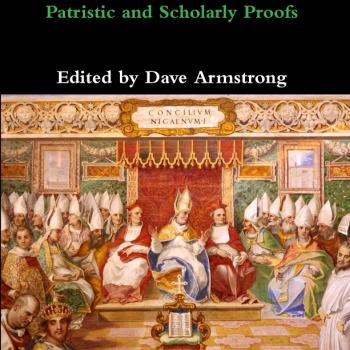
Fresco of St. Basil the Great in the Church of the Theotokos Peribleptos in Ohrid, Macedonia (13th century) [public domain / Wikimedia Commons]
***
(8-1-03)
***
For preliminaries concerning my methodology and the burden of proof for showing if a Church Father believed in sola Scriptura, see my paper, Church Fathers & Sola Scriptura. St. Basil the Great’s words will be in blue. Evangelical Protestant / Anti-Catholic apologist Jason Engwer’s words will be in green.
***
In a Catholic Answers article on tradition, we read the following:
The early Church Fathers, who were links in that chain of [apostolic] succession, recognized the necessity of the traditions that had been handed down from the apostles and guarded them scrupulously, as the following quotations show.
The article goes on to quote some church fathers, such as the following from Basil, without any further explanation:
Of the dogmas and messages preserved in the Church, some we possess from written teaching and others we receive from the tradition of the apostles, handed on to us in mystery. In respect to piety, both are of the same force. No one will contradict any of these, no one, at any rate, who is even moderately versed in matters ecclesiastical. Indeed, were we to try to reject unwritten customs as having no great authority, we would unwittingly injure the gospel in its vitals; or rather, we would reduce [Christian] message to a mere term. (The Holy Spirit 27:66 [A.D. 375])
What is Basil referring to? Judging by the claims of the RCC and the arguments of this Catholic Answers article, you might think Basil was referring to things like papal infallibility, the Assumption of Mary, and privately confessing all sins to a priest. But, instead, here’s what Basil writes just after what Catholic Answers quoted:
For instance, to take the first and most general example, who is there who has taught us in writing to sign with the sign of the cross those who have trusted in the name of our Lord Jesus Christ? What writing has taught us to turn to the East at the prayer? Which of the saints has left us in writing the words of the invocation at the displaying of the bread of the Eucharist and the cup of blessing? For we are not, as is well known, content with what the apostle or the Gospel has recorded, but both in preface and conclusion we add other words as being of great importance to the validity of the ministry, and these we derive from unwritten teaching. Moreover we bless the water of baptism and the oil of the chrism, and besides this the catechumen who is being baptized. On what written authority do we do this? Is not our authority silent and mystical tradition? Nay, by what written word is the anointing of oil itself taught? And whence comes the custom of baptizing thrice? And as to the other customs of baptism from what Scripture do we derive the renunciation of Satan and his angels? Does not this come from that unpublished and secret teaching which our fathers guarded in a silence out of the reach of curious meddling and inquisitive investigation? Well had they learnt the lesson that the awful dignity of the mysteries is best preserved by silence. What the uninitiated are not even allowed to look at was hardly likely to be publicly paraded about in written documents. (The Holy Spirit, 27:66)
Basil refers to relatively minor practices, some of which Roman Catholics don’t follow. He explains that these things are silent and secret mysteries, hidden traditions. Though the Catholic Answers article cites 2 Timothy 2:2, these traditions of Basil are not the public apostolic teachings Paul refers to in that passage.
This is the same (rather silly) rhetorical tactic that Jason later used in our Dialogue, pertaining to Hippolytus, where he writes:
Dave doesn’t tell us what traditions Hippolytus is referring to in that document . . . what should be said when people offer cheese and olives (6), how to appoint widows in the church (10), how to appoint readers (11), . . . the procedures for giving the kiss of peace and women wearing veils (18), how to sing (25), etc. Dave, how often do you offer cheese and olives in your local Roman Catholic church?
This is all fine and dandy as far as it goes: Hippolytus and Basil both refer to minor practices and beliefs as part of the tradition, whether written or unwritten. But it doesn’t therefore follow that they do not also include important, central doctrines in that tradition. I demonstrated how this was true in the case of Hippolytus (and Jason did not reply, as he departed the discussion soon afterwards). It is also true with regard to Basil, as I will demonstrate below.
First, let’s take a look at this same work, and see if Basil is only talking about such traditions as recounted above. It should be noted, however, that the above traditions are not nearly as minor as Hippolytus’ list: the invocation at the words of consecration at Mass is not at all an insignificant thing: it has to do with the central rite of the Christian faith. Baptizing three times is not minor, as most Protestants do this, or something similar to it – at least mentioning the Father, Son, and Holy Spirit, and baptism is a supremely important Christian rite, for Protestants as well as Catholics. But are these the only sort of things that Basil discusses? No:
Let us now investigate what are our common conceptions concerning the Spirit, as well those which have been gathered by us from Holy Scripture concerning It as those which we have received from the unwritten tradition of the Fathers. (The Holy Spirit, 9:22)
I think Jason would agree that the doctrine of the Holy Spirit is not a “relatively minor practice.” To the contrary, it is a “very major” doctrine. Basil is quite comfortable talking about the biblical data concerning the Holy Spirit and also the unwritten tradition. And this is not all:
Whence is it that we are Christians? Through our faith, would be the universal answer. And in what way are we saved? Plainly because we were regenerate through the grace given in our baptism. How else could we be? And after recognising that this salvation is established through the Father and the Son and the Holy Ghost, shall we fling away “that form of doctrine” which we received? Would it not rather be ground for great groaning if we are found now further off from our salvation “than when we first believed,” and deny now what we then received? Whether a man have departed this life without baptism, or have received a baptism lacking in some of the requirements of the tradition, his loss is equal. And whoever does not always and everywhere keep to and hold fast as a sure protection the confession which we recorded at our first admission, when, being delivered “from the idols,” we came “to the living Gods” constitutes himself a “stranger” from the “promises” of God, fighting against his own handwriting, which he put on record when he professed the faith. For if to me my baptism was the beginning of life, and that day of regeneration the first of days, it is plain that the utterance uttered in the grace of adoption was the most honourable of all. Can I then, perverted by these men’s seductive words, abandon the tradition which guided me to the light, which bestowed on me the boon of the knowledge of God, whereby I, so long a foe by reason of sin, was made a child of God? But, for myself, I pray that with this confession I may depart hence to the Lord, and them I charge to preserve the faith secure until the day of Christ, and to keep the Spirit undivided from the Father and the Son, preserving, both in the confession of faith and in the doxology, the doctrine taught them at their baptism. (The Holy Spirit, 10:26)
Note how, for Basil, the tradition is determinative, as the authentic interpretation of Scripture:
Let no one be misled by the fact of the apostle’s frequently omitting the name of the Father and of the Holy Spirit when making mention of baptism, or on this account imagine that the invocation of the names is not observed. “As many of you,” he says, “as were baptized into Christ have put on Christ;” and again, “As many of you as were baptized into Christ were baptized into his death.” For the naming of Christ is the confession of the whole, shewing forth as it does the God who gave, the Son who received, and the Spirit who is, the unction. So we have learned from Peter, in the Acts, of “Jesus of Nazareth whom God anointed with the Holy Ghost; and in Isaiah, “The Spirit of the Lord is upon me, because the Lord hath anointed me;” and the Psalmist, “Therefore God, even thy God, hath anointed thee with the oil of gladness above thy fellows.” Scripture, however, in the case of baptism, sometimes plainly mentions the Spirit alone.“For into one Spirit,” it says, “we were all baptized in one body.” And in harmony with this are the passages: “You shaft be baptized with the Holy Ghost,” and “He shall baptize you with the Holy Ghost.” But no one on this account would be justified in calling that baptism a perfect baptism wherein only the name of the Spirit was invoked. For the tradition that has been given us by the quickening grace must remain for ever inviolate. He who redeemed our life from destruction gave us power of renewal, whereof the cause is ineffable and hidden in mystery, but bringing great salvation to our souls, so that to add or to take away anything involves manifestly a falling away from the life everlasting. If then in baptism the separation of the Spirit from the Father and the Son is perilous to the baptizer, and of no advantage to the baptized, how can the rending asunder of the Spirit from Father and from Son be safe for us? Faith and baptism are two kindred and inseparable ways of salvation: faith is perfected through baptism, baptism is established through faith, and both are completed by the same names. For as we believe in the Father and the Son and the Holy Ghost, so are we also baptized in the name of the Father and of the Son and of the Holy Ghost; first comes the confession, introducing us to salvation, and baptism follows, setting the seal upon our assent. (The Holy Spirit, 12:28)
Jason thinks he has hit a rhetorical home run by quoting the next section after what the Catholic Answers web page cited. But if we return the favor and cite the very next section after the one Jason cited (sort of a patristic – rather than biblical – hopscotch), we find more teaching about the crucial role of tradition in forming the doctrine of the Holy Spirit, and the doxology:
Time will fail me if I attempt to recount the unwritten mysteries of the Church. Of the rest I say nothing; but of the very confession of our faith in Father, Son, and Holy Ghost, what is the written source? If it be granted that, as we are baptized, so also under the obligation to believe, we make our confession in like terms as our baptism, in accordance with the tradition of our baptism and in conformity with the principles of true religion, let our opponents grant us too the right to be as consistent in our ascription of glory as in our confession of faith. If they deprecate our doxology on the ground that it lacks written authority, let them give us the written evidence for the confession of our faith and the other matters which we have enumerated. While the unwritten traditions are so many, and their bearing on “the mystery of godliness is so important, can they refuse to allow us a single word which has come down to us from the Fathers; – which we found, derived from untutored custom, abiding in unperverted churches; – a word for which the arguments are strong, and which contributes in no small degree to the completeness of the force of the mystery? (The Holy Spirit, 27:67)
Four sections later, he reiterates this argument:
Is answer to the objection that the doxology in the form “with the Spirit” has no written authority, we maintain that if there is no other instance of that which is unwritten, then this must not be received. But if the greater number of our mysteries are admitted into our constitution without written authority, then, in company with the many others, let us receive this one. For I hold it apostolic to abide also by the unwritten traditions. “I praise you,” it is said, “that ye remember me in all things, and keep the ordinances as I delivered them to you;” and “Hold fast the traditions which ye have been taught whether by word, or our Epistle.” One of these traditions is the practice which is now before us, which they who ordained from the beginning, rooted firmly in the churches, delivering it to their successors, and its use through long custom advances pace by pace with time. If, as in a Court of Law, we were at a loss for documentary evidence, but were able to bring before you a large number of witnesses, would you not give your vote for our acquittal? I think so; for “at the mouth of two or three witnesses shall the matter be established.” (The Holy Spirit, 27:71)
Protestant patristics expert J. N. D. Kelly cites these sections in his footnotes (along with section 66 – no doubt referring to the information in the Catholic Answers citation), and comments:
Basil made the liturgical custom of baptizing in the threefold name a pivot in his argument for the coequality of the Spirit with Father and Son, pleading that the apostolic witness was conveyed to the Church in the mysteries as well as in Scripture, and that it was apostolic to abide by this unwritten tradition. So when Gregory of Nyssa desired to substantiate the unique generation of the Son, he explained [C. Eunom. 4 (PG 45, 653) ] that it was enough that ‘we have the tradition descending to us from the fathers, like an inheritance transmitted from the apostles along the line of holy persons who succeeded them’. (Early Christian Doctrines, HarperSanFrancisco, revised 1978 edition, 45)
Thus, Kelly differs in his opinion from Jason’s assessment of the range of Basil’s tradition:
What is Basil referring to? Judging by the claims of the RCC and the arguments of this Catholic Answers article, you might think Basil was referring to things like papal infallibility, the Assumption of Mary, and privately confessing all sins to a priest.
Kelly thinks Basil refers to “baptizing in the threefold name” as “a pivot in his argument for the coequality of the Spirit with Father and Son,” which is a bit more of an important matter, and not one that Protestants would disagree with, like the above three Catholic distinctives. So once again, Jason misinterprets the Father he is expounding upon, and contradicts the patristics expert. Jason will claim below that Basil believes in sola Scriptura (at least while he wrote the portion that Jason quotes), but Basil does not pit Scripture against Tradition; rather, he appeals to them both, just as Catholics do:
What our fathers said, the same say we, that the glory of the Father and of the Son is common; wherefore we offer the doxology to the Father with the Son. But we do not rest only on the fact that such is the tradition of the Fathers; for they too followed the sense of Scripture, and started from the evidence which, a few sentences back, I deduced from Scripture and laid before you. (The Holy Spirit, 7:16)
*
Between these opposite parties inspired Scripture is powerless to mediate; the traditions of the apostles cannot suggest terms of arbitration. (The Holy Spirit, 30:77)
In other places, he speaks of tradition only:
. . . the object of attack is faith. The one aim of the whole band of opponents and enemies of “sound doctrine” is to shake down the foundation of the faith of Christ by levelling apostolic tradition with the ground, and utterly destroying it. So like the debtors, – of course bona fide debtors. – they clamour for written proof, and reject as worthless the unwritten tradition of the Fathers. (The Holy Spirit, 10:25)
*
Now one of the institutions of Gregory is the very form of the doxology to which objection is now made, preserved by the Church on the authority of his tradition; . . . (The Holy Spirit, 29:74)
*
. . . we too are undismayed at the cloud of our enemies, and, resting our hope on the aid of the Spirit, have, with all boldness, proclaimed the truth. Had I not so done, it would truly have been terrible that the blasphemers of the Spirit should so easily be emboldened in their attack upon true religion, and that we, with so mighty an ally and supporter at our side, should shrink from the service of that doctrine, which by the tradition of the Fathers has been preserved by an unbroken sequence of memory to our own day. (The Holy Spirit, 30:79)
Jason argues that Basil accepted sola Scriptura because he mentions only Scripture in his Letter 283 and calls it “all-sufficient.” But above he mentions only tradition several times. Obviously, he accepts both; this is no contradiction, but rather, the standard concept of the rule of faith in the Fathers, as we have seen again and again throughout this study. But it is a conclusion that Jason does not desire, so in his polemic he emphasizes the passages mentioning Scripture alone, and minimizes or ignores passage mentioning tradition or Church authority alone. At best, this is logically deficient; at worst one might consider it special pleading.
We know, from what Basil said elsewhere, that not only were his practices sometimes different from those of Roman Catholicism, but so were his doctrines. Earlier in this series, I documented the example of Basil saying that Luke 2:35 is a reference to Mary sinning. Of that scripture interpretation, Basil says, “About the words of Simeon to Mary, there is no obscurity or variety of interpretation.” (Letter 260:6) Catholic Answers tells us that the church fathers were “scrupulous” in guarding the traditions of the apostles. Should we conclude, then, that Basil’s non-Roman-Catholic traditions are apostolic?
Some Church Fathers incorrectly taught that Mary committed actual sin, yes. Insofar as they were wrong in that opinion, they were not transmitting the apostolic deposit, so Catholics would believe (just as Protestants would believe the opposite: if they taught that she was sinless, they would not be transmitting the doctrines of the Bible and the apostles, but unbiblical falsehoods and traditions of men).
Despite what Basil says in the passage quoted by Catholic Answers, he advocates sola scriptura elsewhere. For example:
Enjoying as you do the consolation of the Holy Scriptures, you stand in need neither of my assistance nor of that of anybody else to help you to comprehend your duty. You have the all-sufficient counsel and guidance of the Holy Spirit to lead you to what is right. (Letter 283)
See also the citations of other passages in footnote 563 at [link].
Regardless of whether one argues that Basil advocated sola scriptura consistently, inconsistently, or not at all, the fact remains that he contradicted the Roman Catholic view of tradition.
He did not. He accepted the authority of Church and Tradition, just as Catholics then and now do. We see this in, for example, his Letter 261:
I was distressed to hear that over anti above the disturbance brought on the Churches by the Arians, and the confusion caused by them in the definition of the faith, there has appeared among you yet another innovation, throwing the brotherhood into great dejection, because, as you have informed me, certain persons are uttering, in the hearing of the faithful, novel and unfamiliar doctrines which they allege to be deduced from the teaching of Scripture . . . who has the hardihood now once again to renew by the help of sophistical arguments and, of course, by scriptural evidence, that old dogma of Valentinus, now long ago silenced? . . .These, brethren, are the mysteries of the Church; these are the traditions of the Fathers. Every man who fears the Lord, and is awaiting God’s judgment, I charge not to be carried away by various doctrines. If any one teaches a different doctrine, and refuses to accede to the sound words of the faith, rejecting the oracles of the Spirit, and making his own teaching of more authority than the lessons of the Gospels, of such an one beware . . .
St. Basil the Great, then, is seen to hold the same opinion concerning authority and the rule of faith as all the other Fathers, and it is not sola Scriptura.
*****













